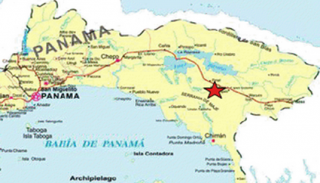Ipeti Colono
![]()
![]()
![]()
![]()
![]()
![]()
![]() Click on Programs to learn more about their work in this community
Click on Programs to learn more about their work in this community
General Information

| Population* | 281 |
| Number of homes | 79 |
| Avg. # of people per home | 3.5 |
| Number and % of children |
(0-5): 13 / 4.6% (0-12): 150 / 53.3% |
| Electricity | yes |
| Corregimiento | Torti |
| District | Chepo |
| Corresponding Health Center | Centro de Salud - Torti |
| Distance from compounds | 2 hours |
| Road conditions | Poor |
* Population does not reflect how many patients will be seen on medical
brigades as many people from surrounding communities come seeking
Medical Brigades medical attention.
Expressed Needs and Capacities
Ipeti Colono has expressed interest in a multitude of improvements and projects within the community. They want to improve their access to healthcare, improve the roads, fix and update their aqueduct system, as well as improve their water treatment situation.
Ipeti Colono’s education system includes a sole primary school located by the entrance of the community. With 163 students, the primary school has only 4 teachers. For further education, the students are able to access the high school in Torti, which is about 15 minutes away via bus.
Ipeti Colono has a gravity-based aqueduct water system installed in the community. The water is available through the existing infrastructure daily, without interruption. Though it contains an automatic chlorination system that treats the water every 4 or 5 days, a large complaint of the community is that the water is still unclean, and they often have to boil the water before consumption for safety. The six-member water committee meets every six months, and the president is Luis Cedeno. 100% of the homes in Ipeti Colono are connected to this system, but the unreliability of its automatic chlorination system is of concern to the community.
Ipeti Colono does not have a Puesto de Salud (Health Facility) within the community; meaning residents must travel to Torti 15 minutes away in order to receive care. There are no trained health professionals within the community, nor does it have a health committee.
The most common illnesses seen by community members are colds, gastrointestinal ailments, and skin infections. Approximately 40% of the community has latrines, and about 98% of homes have concrete floors. None of the homes use filtration when consuming the water.
The majority of homes are constructed out of cinderblock and wood with zinc-plate roofs. Approximately 80% of community members identify their main source of income earned through agriculture. The main crops produced within Ipeti Colono are corn, rice, and yucca. Within the community there are several small businesses including: small storefronts, a cantina, restaurants, and a butcher/meat shop.
There is no bank or financial institution located within Ipeti Colono. There is a savings and loans cooperative in Torti, however this requires time, effort, and money to have and access an account. Without a local community bank or cooperative, Ipeti Colono lacks the appropriate and necessary access to financial resources.
In Ipeti Colono, the central method of waste management is burning their trash. For trash that isn’t burned, it collects in a nearby landfill, which isn’t sorted for recycling. The community does not recycle any of their goods. For environmental education, there is currently no program that exists, resulting in a deficit of education on the topics of waste management and sustainable agriculture. Ipeti Colono does not currently have an Environmental Committee, though is looking to build environmental awareness within the community.
Ipeti Colono does not have any lawyers available in the community, though a volunteer judicial facilitator has legal training within the community who often provides guidance to those who are unfamiliar with legal processes. There is no communal land within the community, but almost no one possesses a proper land title, leading to conflicts. Another common legal issue in the community is childcare and alimony.
Ipeti Colono has worked with a non-profit called Capacitaciones Judiciales, which focuses on legal training and workshops.
Currently only Global Brigades’ Medical and Dental Programs operate in the community of Ipeti Colono.
Source of information: Key informant interview
Date of interview: October 14, 2013
Last updated: December 19, 2013